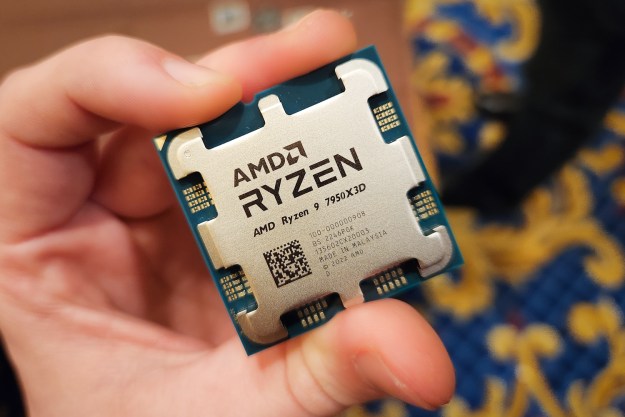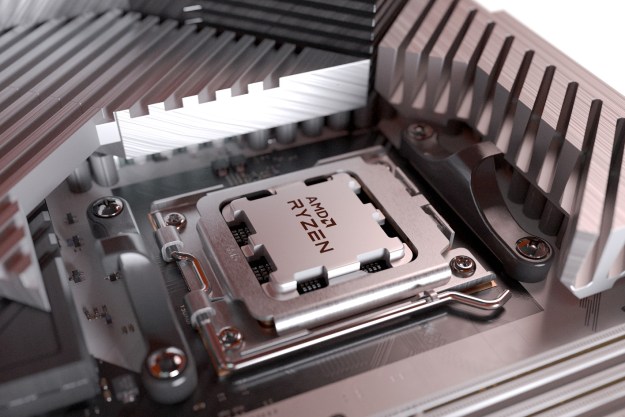AMD’s second-generation Ryzen desktop processors will be made available on April 19 according to now-removed listings spotted on Amazon and other online retailers. AMD has yet to make an official announcement, but so far, we see four separate processors hitting stores next month: Two new Ryzen 7 eight-core chips and two Ryzen 5 six-core processors.
Take a look:
| Ryzen 7 2700X |
Ryzen 7 2700 |
Ryzen 5 2600X |
Ryzen 5 2600 |
|
| Product ID: |
YD270XBGAFBOX |
YD2700BBAFBOX |
YD260XBCAFBOX |
YD2600BBAFBOX |
| Cores: |
8 |
8 |
6 |
6 |
| Threads: |
16 |
16 |
12 |
12 |
| Base speed: |
3.7GHz |
3.2GHz |
3.7GHz |
3.4GHz |
| Maximum speed: |
4.35GHz |
4.1GHz |
4.25GHz |
3.9GHz |
| Power use: |
105 watts |
65 watts |
95 watts |
65 watts |
| DDR4 support: |
2,933MHz |
2,933MHz |
2,933MHz |
2,933MHz |
| Cooler: |
Wraith Prism |
Wraith Spire |
Wraith Spire |
Wraith Stealth |
| Price: |
$369 |
$299 |
$249 |
$199 |
Last year when AMD introduced its first batch of Ryzen desktop processors, customers wanting to upgrade had to swap out their PC’s motherboard due to the new AM4 seat/socket requirement. That is not the case here with the company’s second-generation chips although if you want the full benefits introduced by the updated Zen+ design, you may want to consider swapping out the motherboard again for models based on AMD’s new X470 high-end and B450 mid-range chipsets.
Here are the differences between the current Ryzen 7 1700 series and the upcoming Ryzen 7 2700 series:
| Ryzen 7 2700X |
Ryzen 7 1700X |
Ryzen 7 2700 |
Ryzen 7 1700 |
|
| Architecture: |
Zen+ |
Zen |
Zen+ |
Zen |
| Cores: |
8 |
8 |
8 |
8 |
| Threads: |
16 |
16 |
16 |
16 |
| Base speed: |
3.7GHz |
3.4GHz |
3.2GHz |
3.0GHz |
| Maximum speed: |
4.35GHz |
3.8GHz |
4.1GHz |
3.7GHz |
| Power use: |
105 watts |
95 watts |
65 watts |
65 watts |
| Price: |
$369 |
$290 |
$299 |
$275 |
As the specifications show, the 2700 series relies on the same number of cores and threads but provides a speed boost over their predecessors. The Ryzen 7 2700 remains the same power consumption-wise while the upcoming 2700X will require slightly more power than the older 1700X model.
What we’re currently missing from the entire Ryzen refresh scheme is an updated version of AMD’s Ryzen 7 1800X chip although the 2700X supposedly replaces that model along with the 1700X. Recent benchmarks show the 2700X is 18 percent faster than the 1700X, and 11 percent faster than the 1800X. AMD still could have a Ryzen 7 2800X chip on the horizon: Perhaps inserted into its second-generation Threadripper family for a wider selection?
Now here is a comparison of the Ryzen 5 desktop processors:
| Ryzen 5 2600X |
Ryzen 5 1600X |
Ryzen 5 2600 |
Ryzen 5 1600 |
|
| Architecture: |
Zen+ |
Zen |
Zen+ |
Zen |
| Cores: |
6 |
6 |
6 |
6 |
| Threads: |
12 |
12 |
12 |
12 |
| Base speed: |
3.7GHz |
3.6GHz |
3.4GHz |
3.2GHz |
| Maximum speed: |
4.25GHz |
4.0GHz |
3.9GHz |
3.6GHz |
| Power use: |
95 watts |
95 watts |
65 watts |
65 watts |
| Price: |
$249 |
$199 |
$199 |
$189 |
Again, we see a speed boost in the new Ryzen 5 processors although the difference between the 2600X and the 1600X may not push customers into upgrading from the first-generation chip. In this case, upgrading would be more beneficial for customers with AMD processors released before Ryzen. Meanwhile, you will see a decent speed increase if moving from the 1600 chip to the newer 2600 model.
Overall, AMD’s refreshed Zen architecture (Zen+) not only introduces higher clocks speeds, but support for memory clocked at 2,933MHz versus 2,400MHz seen with the first generation. They also support AMP and XMP ratings for memory speeds beyond the 2,933MHz mark.
AMD will likely officially reveal its second-generation Ryzen processors next week during the Game Developers Conference in San Francisco.
Editors' Recommendations
- AMD’s upcoming APUs might destroy your GPU
- 4 CPUs you should buy instead of the Ryzen 7 7800X3D
- AMD’s next-gen CPUs are much closer than we thought
- AMD makes older PCs more upgradeable once again
- The one AMD 3D V-Cache processor you should avoid at all costs



